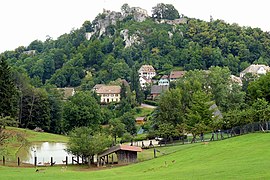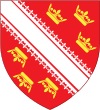Ferrette
Appearance
(Redirected from Pfirt)
Ferrette | |
|---|---|
 A general view of Ferrette | |
| Coordinates: 47°30′N 7°19′E / 47.50°N 7.32°E | |
| Country | France |
| Region | Grand Est |
| Department | Haut-Rhin |
| Arrondissement | Altkirch |
| Canton | Altkirch |
| Government | |
| • Mayor (2022–2026) | François Cohendet[1] |
Area 1 | 1.94 km2 (0.75 sq mi) |
| Population (2022)[2] | 848 |
| • Density | 440/km2 (1,100/sq mi) |
| Time zone | UTC+01:00 (CET) |
| • Summer (DST) | UTC+02:00 (CEST) |
| INSEE/Postal code | 68090 /68480 |
| Elevation | 429–640 m (1,407–2,100 ft) (avg. 550 m or 1,800 ft) |
| 1 French Land Register data, which excludes lakes, ponds, glaciers > 1 km2 (0.386 sq mi or 247 acres) and river estuaries. | |
Ferrette (French pronunciation: [fɛʁɛt] ⓘ; German: Pfirt [pfɪʁt] ⓘ; Alsatian: Pfìrt) is a commune in the Haut-Rhin department in Alsace in north-eastern France.
It is situated close to the Swiss border. Its main attraction is the Château de Ferrette.
County of Ferrette
[edit]The County of Ferrette came into existence in the 11th century and consisted of a large part of southern Alsace. In 1324, the County was acquired by Austria through the marriage of Jeanne, Countess of Ferrette, with Albert II, Duke of Austria. The County was part of the dowry for Catherine of Burgundy upon her marriage to Duke Leopold IV.[3] Upon Leopold's death in 1411, his brother, Frederick occupied Ferrette.[3] Austria ceded it to France in the Peace of Westphalia of 1648.
Population
[edit]| Year | Pop. | ±% p.a. |
|---|---|---|
| 1968 | 798 | — |
| 1975 | 783 | −0.27% |
| 1982 | 727 | −1.05% |
| 1990 | 863 | +2.17% |
| 1999 | 1,020 | +1.87% |
| 2006 | 1,063 | +0.59% |
| 2009 | 873 | −6.35% |
| 2014 | 683 | −4.79% |
| 2020 | 820 | +3.09% |
| Source: INSEE[4] | ||
See also
[edit]References
[edit]- ^ "Répertoire national des élus: les maires" (in French). data.gouv.fr, Plateforme ouverte des données publiques françaises. 16 December 2022.
- ^ "Populations de référence 2022" (in French). The National Institute of Statistics and Economic Studies. 19 December 2024.
- ^ a b Richard Vaughan, Philip the Good: The Apogee of Burgundy, (The Boydell Press, 2002), 31.
- ^ Population en historique depuis 1968, INSEE
Wikimedia Commons has media related to Ferrette.







